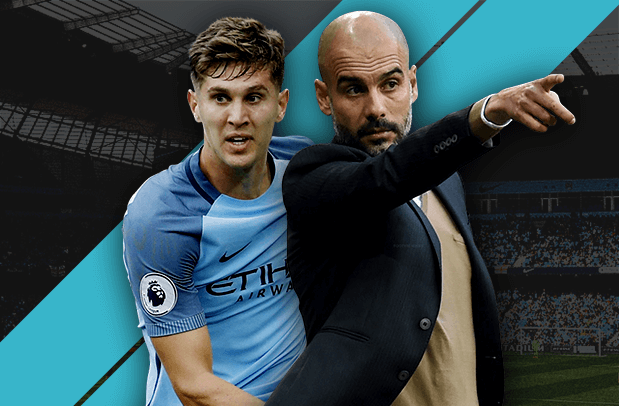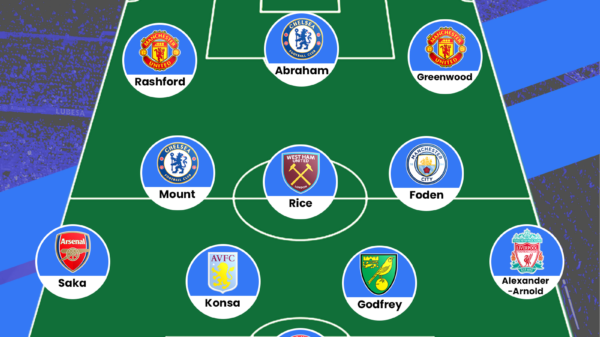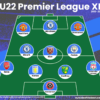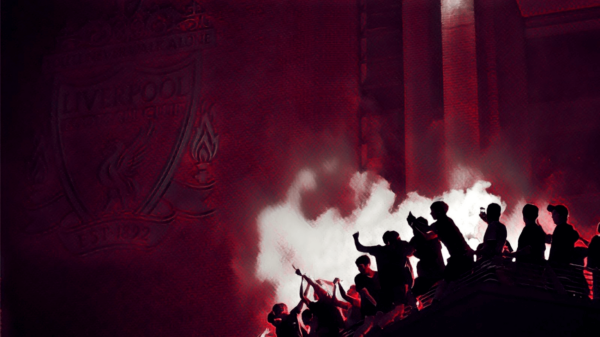Bryan Whitelock analyses how good a fit the new Manchester City signing John Stones would be under Pep Guardiola.
Editor’s Note: Please note that the article was written prior to the Manchester City- West Ham match this Sunday, and stats are current for the period before that match.
Following his £47.5 million move to the Etihad, John Stones has been leading the defence for Manchester City under the prosperous Pep Guardiola. Much has been made over the last 12 months surrounding Stones’ ability to defend and his decision making, which can get him in trouble from time to time, but it feels like he is at the perfect club, under the perfect manager, to advance his game and become one of Europe’s leading centre backs.

Stones’ career so far has not been a stroll in the park; whilst at Everton he was encouraged to bring the ball out from the back, but not everyone in the team was on his wave-length or shared his determination to play in that manner and he, along with the manager, Roberto Martinez, was the scape goat of some disastrous results. It was not the performances that he or the manger would have wanted, especially for the manger as he was sacked after a disastrous campaign, but the fans were also becoming restless with Stones’ determination, despite the danger, to try to play out of defence instead of ‘getting rid’, as the English crowds seem to love and crave. The fans started booing and heckling, pundits were criticising and Stones took a place on the bench.
As a consequence of being dropped by Roberto Martinez, Stones did not play a single minute of England’s catastrophic Euro campaign. Jose Mourinho’s pursuit of the defender seemed a distant memory and whilst he was seemingly on the road to success, his season took a sharp left and headed into misery. Bench warming misery. Even other managers took a swipe, with Sam Allardyce stating in May, “I’d teach him how to defend.”
One season on and he was pursued by another managerial heavyweight: Pep Guardiola. Seemingly, the planets aligned for the young ball-playing defender and the pursuit was successful. It seems like the perfect marriage between player and manager; a player who excels in build-up play and a manager who is possessive about it. Guardiola will no doubt teach him how to defend, but it will be a whole different lesson to what Allardyce would give. However, despite the risk taking nature of Guardiola’s philosophy, his teams have conceded the least goals in every one of his league campaigns, a statistic he will want to continue in his time at Manchester.
|
Season |
Club | Goals Conceded |
|
2008/09 |
Barcelona | 35 |
|
2009/10 |
Barcelona | 24 |
| 2010/11 | Barcelona |
21 |
| 2011/12 | Barcelona |
29 |
|
2012/13 |
Bayern Munich | 23 |
| 2013/14 | Bayern Munich |
18 |
| 2014/15 | Bayern Munich |
17 |
After signing for City, Stones admitted he was “shocked” and confessed that Pep Guardiola played a “big part” in his decision to join. He was thrusted straight into the starting line-up of the first game at home to Sunderland, and his build-up play was on evidence throughout. Starting alongside left back Kolarov, who was his central defensive partner on the day, Stones attempted 78 passes at a success rate of 89.7%, with 37 of those passes being played successfully forward. City struggled slightly but still came away with a 2-1 win to open their campaign with three points.

Stones’ Passing vs. Sunderland
With City finishing in fourth place in the Premier League last season, Champions League qualification needed to be won through a play-off against Steaua Bucharest. Putting out a full strength team looking to kill the game in the first leg, Guardiola gave Stones his Champions League debut. This time his central defensive partner was Otamendi, but his performance was another exceptional display of ball-playing, even if he shifted over to play on the left side of defence to accommodate Otamendi. Stones completes 64 passes from an attempted 68 with a success rate of 94.1%. City all but won their place in the group stage of the Champions League with a 5-0 win and could turn their concentration back to the Premier League.
With captain and leader Vincent Kompany still out but completing light ball work in training, Stones was demonstrating why City paid a hefty price for the ex-Barnsley man as he delivered a man of the match performance away at Stoke City. Guardiola no doubt feels comfortable with Stones in defence because of his excellent passing ability but also because he can trust him. This trust is evident in Guardiola’s team selection with him preferring to play Stones in the more difficult role of left sided centre back than Otamendi, despite Otamendi’s superior experience. Although Stones recorded his lowest passing statistic from the three games so far, with 50 out of 54 passes being completed, he made seven clearances and looked composed throughout. Out of his 50 successful passes, 30 of them were forward, helping to move the ball into midfield and start attacks. City won the game 4-1 and won all three of their competitive games of the season so far, a run they would like to extend.

Stones’ Forward Passes vs. Stoke
|
John Stones’ Match Statistics This Season |
|||||
|
Opponent |
Passes | Pass Completion Percentage | Forward Passes | Touches | Clearances |
| Sunderland (H) | 70/78 | 89.7% | 37/44 | 85 |
2 |
|
Steaua Bucharest (A) |
64/68 | 94.1% | 41/45 | 85 | 8 |
| Stoke City (A) | 50/54 | 92.6% | 30/34 | 66 |
7 |
Guardiola will be jubilant about Stones’ start to the season and his build-up play. Playing out from the back with patience but incisive build-up play is integral to Guardiola’s style. “I am obsessive about the build-up game, because I believe from my experience as a football player, as a coach, that when you make a good build-up from the goalkeeper, central defenders, full-backs, midfield players, the other comes along,” Guardiola commented when speaking about Stones’ start to the new season and his playing style.
Over the last six seasons, Guardiola’s team have ranked first in the division for passing, and Stones will help carry on that trend as the team looks to dominate the ball in every game. Guardiola commented on his teams passing and build up play in the pre-match conference before the Stoke game, highlighting Stones as an important cog in the system: “Our build-up in the last two games was really, really good because John helped us a lot in that, that’s why we tried to buy him.”
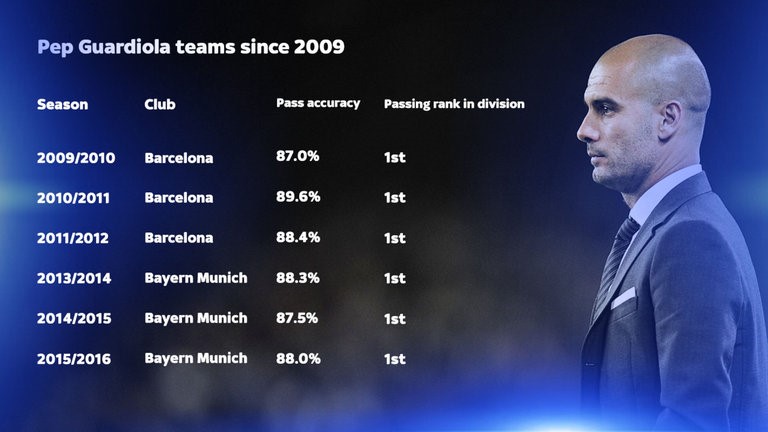
Even though Stones did not feature for England in the Euros, Gary Neville had hands-on experience in seeing the youngster up close and personal on a daily basis in training. Speaking on Sky Sports’ Monday Night Football, Neville reflected on criticism of Stones’ last season and compared him to one of Europe’s best defenders, who quickly flourished under Guardiola at Barcelona. “In the past six months there has been so much criticism of John Stones – about what he shouldn’t do, about how he shouldn’t play – rather than celebrating what he is, that he’s willing to take big chances at the back on the ball. It reminds me of six, seven, eight years ago, a player exposed to Guardiola. It was a young Gerard Pique. You see a lot of Stones in Pique – a person who’s not filled his shirt yet.” Comparisons with Pique are clear and with Guardiola at the helm, Stones could well replicate the Spanish international’s rise to the pinnacle of football. Whilst the opinion is not exclusive, it has been credited by the highly respected Gary Neville, who was an excellent defender in his own right, a recent coach with England under Roy Hodgson, and a highly respected pundit for Sky Sports.
Looking to the future, there is hardly a doubt that if Stones stays focused under Guardiola, the pair can have a fruitful tenure together, and he will become one of the best centre backs in Europe. Trophies will be waiting, pundits will be applauding, the pair will be revelling. Guardiola has the ability to lead City to their best period in the club’s history and leave a lasting legacy on the club and the Premier League. But if he does do it, then it will be with John Stones at the heart of the defence, the embodiment of the Guardiola way – a perfect marriage.
- Guardiola and Stones: A Perfect Marriage - August 30, 2016
- Analysis: Spain’s European Story - June 7, 2016
- Analysis: The Mauricio Pochettino Effect - May 26, 2016




















































